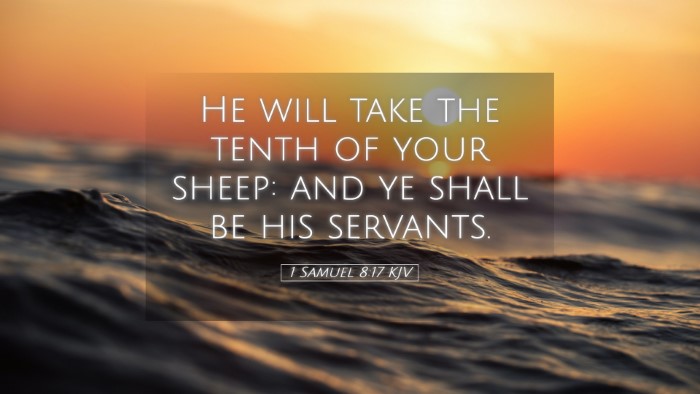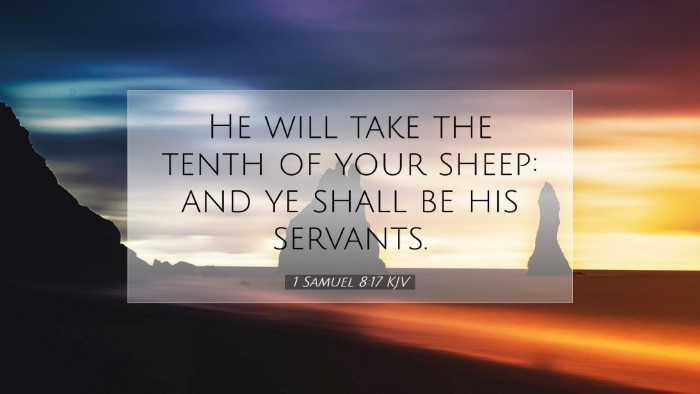Commentary on 1 Samuel 8:17
Verse Text: "And he will take the tenth of your sheep: and ye shall be his servants." (1 Samuel 8:17)
Introduction
The request for a king in Israel, as seen in 1 Samuel 8, marks a significant turning point in the history of the nation. This particular verse addresses the consequences of such a desire, emphasizing the cost of human leadership over divine guidance. Both ancient and contemporary readers are challenged to reflect on the implications of leadership and servitude.
Historical Context
The context of 1 Samuel 8 involves the Israelites' frustration with their governance by the judges, particularly Samuel, whose age and the corrupt practices of his sons are highlighted. This dissatisfaction leads to a demand for a king like those of other nations, revealing a deeper spiritual rebellion against God’s rule.
Theological Insights
1 Samuel 8:17 offers profound theological reflections on servanthood and the nature of kingship. Notably, it reveals the cost associated with turning away from God's leadership.
- Servanthood: The verse underscores that a king will impose servitude, emphasizing that rulers tend to exploit their subjects.
- Divine vs. Human Authority: The passage serves as a critical reminder of the distinction between God's righteous rule and the often self-serving tendencies of human leaders.
- Consequences of Choices: The Israelites' choice for a king reflects a disregard for God's wisdom, which leads them into a cycle of oppression and sin.
Commentary Insights
Matthew Henry: Henry emphasizes the ramifications that this choice has on the community. He notes that the desires for a monarchy stem from a lack of trust in God's sovereignty. The demand for a king is indicative of Israel's inclination to conform to societal norms rather than adhering to God's design for governance.
Albert Barnes: Barnes elaborates on the nature of taxation, indicating that the king's request for a tenth of the sheep symbolizes the economic burden of monarchies. Barnes notes that this taxation serves not only to support the royal household but also to sustain military endeavors, suggesting an impending shift from reliance on God to reliance on human power and resources.
Adam Clarke: Clarke provides a pastoral reflection on the human condition, illustrating that the desire for a reigning sovereign often leads to unforeseen consequences. He asserts that the text presents a moral dilemma: the foreknowledge of exploitation juxtaposed with the people's choice underscores a lack of appreciation for divine providence and protection.
Practical Applications
This verse challenges modern believers to critically evaluate their own trust in God versus reliance on human structures. Several applications can be drawn:
- Evaluate Leadership: Leaders are called to serve rather than dominate. The church and society must seek leaders who embody humility and servant leadership.
- Understand Costs: The church must discern the implications of choices made in striving for worldly recognition or methods. Every decision has potential costs.
- Return to Divine Guidance: In times of confusion or societal pressure, believers should seek God's guidance rather than conforming to cultural expectations.
Conclusion
1 Samuel 8:17 serves as a warning of the perils associated with rejecting God's leadership in favor of human kingship. The insights drawn from public domain commentaries offer a rich tapestry of understanding, inviting readers to consider the broader implications of governance, servitude, and trust in God. In an age where cultural pressures prompt compromises in faith practices, this verse encourages a return to foundational truths and dependence on God's sovereign rule.


